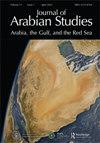Oil and Institutional Stasis in the Persian Gulf
Q1 Social Sciences
引用次数: 3
Abstract
Abstract Oil has seriously impacted the institutional development of the state in the Arabian Peninsula. More specifically, the sudden and unprecedented acquisition of massive oil revenues resulted in the freezing of the state’s formal and informal institutions, at the point at which petrodollars were injected into the state’s coffers. From then on, state leaders were able to deploy the state’s wealth to dictate the pace and direction of institutional change. Over time, any institutional change has been directed towards enhancing regime security, and the pace of change has been calculated and deliberately slow. Any political opening has been dictated by the logic of state power maximization (in relation to society). At the same time, partly to ensure its popular legitimacy and partly through the vision of its leaders, the state has deployed its massive wealth both to foster rapid economic and infrastructural development, and to enhance the living standards of its citizens. In other words, whereas oil may have stunted institutional development –– i.e., an institution’s curse –– it has been an economic blessing.波斯湾的石油和制度停滞
石油问题严重影响了阿拉伯半岛国家的制度发展。更具体地说,突然和前所未有的大量石油收入导致国家正式和非正式机构的冻结,而石油美元则注入了国家的金库。从那时起,国家领导人就能够调动国家的财富来决定制度变革的速度和方向。随着时间的推移,任何制度变革都是为了加强政权安全,而变革的步伐是经过深思熟虑和刻意放慢的。任何政治开放都是由国家权力最大化的逻辑所决定的(相对于社会而言)。与此同时,部分是为了确保其在民众中的合法性,部分是通过其领导人的远见卓识,该国已将其庞大的财富用于促进经济和基础设施的快速发展,并提高其公民的生活水平。换句话说,尽管石油可能阻碍了制度的发展——也就是说,一个制度的诅咒——但它一直是经济的福音。
本文章由计算机程序翻译,如有差异,请以英文原文为准。
求助全文
约1分钟内获得全文
求助全文

 求助内容:
求助内容: 应助结果提醒方式:
应助结果提醒方式:


